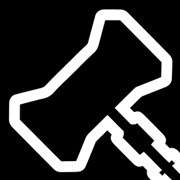?! (Paradox Ruling)
I need a ruling on a custom card I made for JBYT_Unglued. What would happen if I played this?
http://mtgcardsmith.com/view/paradox-6
http://mtgcardsmith.com/view/paradox-6
This discussion has been closed.
 MTG Cardsmith Community Forums
MTG Cardsmith Community Forums
Comments
Edit: Correction. If the first two effects read as replacement effects, it would cause you to win the game. Appropriate rule:
614.5. A replacement effect doesn’t invoke itself repeatedly and gets only one opportunity for each event.
And no, I can't make a good Magic online.
Edit: Also based on further review, the " lose" option is first and if the previous semantics of the ability being based on replacement effects stands, it would replace the lose with win with lose. You would lose>win>lose before you win>lose>win.
That is all.
First, ignore the last line "You win the game". You proceed with the two last lines in printed order, and the first line will either win you or lose you the game, so in no case do you ever get to apply the second line (barring other effects like Angel's grace)
Second, note that the two replacement effects are not available for you to choose from when replacing the first instance of "you lose the game".
So when you would lose, instead you win, and instead you lose (then you stop applying the replacement effects because you can only apply each once.)
Other than that, @Biblio1 is correct again.
According to several sources, if one person wins the game, everyone else loses...
What the heck?! Does this mean everyone loses?!
And strictly speaking, they only lose in reality. Within the constrains of the game, they didn't lose. Otherwise Lich's mirror would stop your opponent from winning. Which makes no sense whatsoever.
So, in the end, if you win, it's up to the people you're playing with to decide whether or not that means they all lost. The game is over, however.
608.2c The controller of the spell or ability follows its instructions in the order written. However, replacement effects may modify these actions. In some cases, later text on the card may modify the meaning of earlier text (for example, “Destroy target creature. It can’t be regenerated” or “Counter target spell. If that spell is countered this way, put it on top of its owner’s library instead of into its owner’s graveyard.”) Don’t just apply effects step by step without thinking in these cases—read the whole text and apply the rules of English to the text.
Other relevant rules:
800.4a When a player leaves the game, all objects (see rule 109) owned by that player leave the game and any effects which give that player control of any objects or players end. Then, if that player controlled any objects on the stack not represented by cards, those objects cease to exist. Then, if there are any objects still controlled by that player, those objects are exiled. This is not a state-based action. It happens as soon as the player leaves the game. If the player who left the game had priority at the time he or she left, priority passes to the next player in turn order who’s still in the game.
never be known!! Never!!!
In order of how harshly I judge smithed cards:
4. All else
3. Artwork
2. Templating
1. Un- cards. (Un- cards are NOT senseless.)
Anything that happens in a game. See rule 700.1." Rule 700.1 "Anything that happens in a game is an event." Self-Replacements: Rule 614.15. "Some replacement effects are not continuous effects. Rather, they are an effect of a resolving spell or ability that replace part or all of that spell or ability's own effect(s). Such effects are called self-replacement effects. When applying replacement effects to an event, self-replacement effects are applied before other replacement effects."
"Yes, a spell's text can cause someone to Lose the game.. but NOT IN THE MIDDLE OF RESOLUTION. It resolves fully, then the loss is applied as a State-Based Action"
You just made that up and it's wrong. Show me the rule that says that a "lose the game effect" doesn't take effect until state based actions are checked. (It should be easy since the damage, poison, and draw losing conditions all state that explicitly) Or perhaps next you want to tell me that when a spell tells you to draw a card, you actually have to wait for state-based actions happen?
This was the question (they wouldn't make a ruling on custom cards, so I had to modify the question)
"better example i suppose. Its as close to what i want answered anyways. if s player controls cast through time (an enchantment that grants rebound to instant and sorcery spells you control) and proceeds to cast coalition victory, and has met the victory condition, when the spell resolves woukd you end thr game at the "you win the game" effect or would the spell continue to resokve (i.e. exiling to be Rebounded at your next upkeep)"
This was the ruling:
104.1. A game ends immediately when a player wins, when the game is a draw, or when the game is restarted.
704.5. The state-based actions are as follows:
704.5a If a player has 0 or less life, he or she loses the game.
704.5b If a player attempted to draw a card from a library with no cards in it since the last time state-based actions were checked, he or she loses the game.
704.5c If a player has ten or more poison counters, he or she loses the game. Ignore this rule in Two-Headed Giant games; see rule 704.5u instead.
704.5d If a token is phased out, or is in a zone other than the battlefield, it ceases to exist.
704.5e If a copy of a spell is in a zone other than the stack, it ceases to exist. If a copy of a card is in any zone other than the stack or the battlefield, it ceases to exist.
704.5f If a creature has toughness 0 or less, it’s put into its owner’s graveyard. Regeneration can’t replace this event.
704.5g If a creature has toughness greater than 0, and the total damage marked on it is greater than or equal to its toughness, that creature has been dealt lethal damage and is destroyed. Regeneration can replace this event.
704.5h If a creature has toughness greater than 0, and it’s been dealt damage by a source with deathtouch since the last time state-based actions were checked, that creature is destroyed. Regeneration can replace this event.
704.5i If a planeswalker has loyalty 0, it’s put into its owner’s graveyard.
704.5j If a player controls two or more planeswalkers that share a planeswalker type, that player chooses one of them, and the rest are put into their owners’ graveyards. This is called the “planeswalker uniqueness rule.”
704.5k If a player controls two or more legendary permanents with the same name, that player chooses one of them, and the rest are put into their owners’ graveyards. This is called the “legend rule.”
704.5m If two or more permanents have the supertype world, all except the one that has had the world supertype for the shortest amount of time are put into their owners’ graveyards. In the event of a tie for the shortest amount of time, all are put into their owners’ graveyards. This is called the “world rule.”
704.5n If an Aura is attached to an illegal object or player, or is not attached to an object or player, that Aura is put into its owner’s graveyard.
704.5p If an Equipment or Fortification is attached to an illegal permanent, it becomes unattached from that permanent. It remains on the battlefield.
704.5q If a creature is attached to an object or player, it becomes unattached and remains on the battlefield. Similarly, if a permanent that’s neither an Aura, an Equipment, nor a Fortification is attached to an object or player, it becomes unattached and remains on the battlefield.
704.5r If a permanent has both a +1/+1 counter and a -1/-1 counter on it, N +1/+1 and N -1/-1 counters are removed from it, where N is the smaller of the number of +1/+1 and -1/-1 counters on it.
704.5s If a permanent with an ability that says it can’t have more than N counters of a certain kind on it has more than N counters of that kind on it, all but N of those counters are removed from it.
704.5t In a Two-Headed Giant game, if a team has 0 or less life, that team loses the game. See rule 810, “Two-Headed Giant Variant.”
704.5u In a Two-Headed Giant game, if a team has fifteen or more poison counters, that team loses the game. See rule 810, “Two-Headed Giant Variant.”
704.5v In a Commander game, a player that’s been dealt 21 or more combat damage by the same commander over the course of the game loses the game. See rule 903, “Commander.”
704.5w In an Archenemy game, if a non-ongoing scheme card is face up in the command zone, and it isn’t the source of a triggered ability that has triggered but not yet left the stack, that scheme card is turned face down and put on the bottom of its owner’s scheme deck. See rule 904, “Archenemy.”
704.5x In a Planechase game, if a phenomenon card is face up in the command zone, and it isn’t the source of a triggered ability that has triggered but not yet left the stack, the planar controller planeswalks. See rule 901, “Planechase.”
As you can see, "if a player has won the game/lost the game" is not included. It happens immediately and ends the game. It does not wait until the next time a player would receive priority.
Ok so just for fun, let's say I had a 20/20 Marit Lage token, Mayael's Aria, Nefarious Lich, Forbidden Crypt, and no cards in my graveyard or library. This setup actually gets you a "lose the game,win the game" condition in one effect